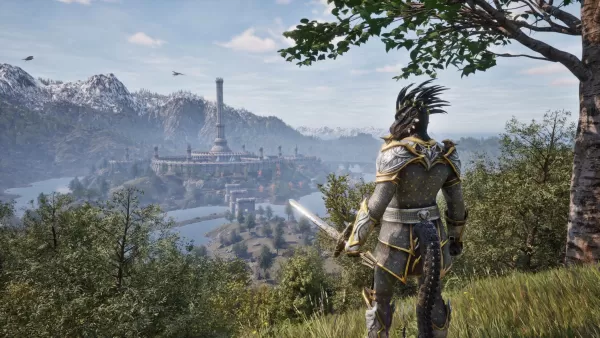By Azura, by Azura, by Azura – the rumors were true. Yesterday, Bethesda set the internet ablaze by finally unveiling Virtuos' remaster (or perhaps a full-fledged remake?) of The Elder Scrolls IV: Oblivion. An 'Elder Scrolls Direct' event culminated in a surprise shadow-drop, which instantly drew in hundreds of thousands of concurrent players. This moment of global excitement and celebration feels like a much-needed respite amidst the recent challenges faced by Bethesda Game Studios. From years of managing the fallout from Fallout 76's rocky launch to the lukewarm reception of its new sci-fi venture, Starfield, the studio's latest projects have left many fans wondering: Has Bethesda lost its magic touch? With fierce competition in the RPG genre from acclaimed titles like Larian Studios' Baldur's Gate 3 and Obsidian's The Outer Worlds franchise, which are seen as spiritual successors to Elder Scrolls and Fallout, the future of Bethesda's flagship series remains uncertain. While Elder Scrolls 6 and Fallout 5 may still be years away, this re-release of Oblivion might just be the first step towards recapturing the studio's former glory – though perhaps not in the way you might expect.
At its peak, Bethesda Game Studios was a titan in the RPG world. In 2020, leaked FTC documents from Microsoft revealed that Fallout 4 had sold 25 million units to date, with over 5 million units sold in its first week according to VGChartz. In 2023, Todd Howard announced that Skyrim had crossed the 60 million sales mark, boosted by its numerous re-releases. In contrast, Starfield has only managed to sell an estimated 3 million units a year and a half after its launch. Despite the inclusion of Game Pass subscribers and the absence of a PlayStation release, these numbers likely represent a disappointment for Bethesda. Even Starfield's dedicated fanbase has expressed dissatisfaction with the game's first expansion, Shattered Space.
This situation presents a significant challenge for the developer. With The Elder Scrolls 6 "years away" and Fallout 5 still a distant dream, how can this once-iconic RPG studio reignite the passion of its fanbase? The answer may lie in revisiting its past.
Rumors about the Elder Scrolls IV: Oblivion remaster surfaced in September 2023, following the leak of Microsoft documents that listed several unannounced Bethesda titles, including a remaster of the 2006 classic set in Tamriel. The buzz grew louder in January 2025 when a former Virtuos employee revealed additional details, sparking debates among Elder Scrolls fans about the remaster's authenticity. Finally, last week the news broke early, setting the internet on fire – Google searches for 'The Elder Scrolls IV: Oblivion' surged by 713% in the last week alone, totaling over 6.4 million searches. At its peak, Bethesda's reveal livestream attracted over half a million viewers. Despite the leaks, or perhaps because of them, over 600,000 people tuned in to witness the re-reveal of a 19-year-old game. The overwhelming demand to play the remaster led to crashes on discount game key websites like CDKeys, and slowed down Fanatical and Green Man Gaming. As of yesterday, Oblivion on Steam boasted 125,000 concurrent players and secured the #1 spot on the best-seller list. The enthusiasm Bethesda fans have for Oblivion is as intense as the flames that erupt from the Oblivion gates themselves.
The answer to re-engaging the fanbase may lie in revisiting Bethesda's past. "The message from players is clear: if you (re)build it, they will come." What better way to keep fans engaged during these long development cycles than by inviting them to revisit the mystical lands of Morrowind or the post-apocalyptic wastelands of the East Coast? From a commercial perspective, this strategy is a no-brainer. While Bethesda's main development team focuses on their ambitious new projects, trusted partners like Virtuos can leverage historical blueprints to create remasters in a shorter timeframe. These remasters appeal to built-in audiences and introduce a new generation to the rich worlds of Tamriel and the Fallout universe.
Bethesda has previously leveraged its catalog effectively. During the first season of the Fallout TV show on Prime Video, Fallout 4 was discounted by up to 75%, accompanied by a timely next-gen update that incorporated elements from the show. As a result, Fallout 4 saw a sales increase of over 7,500% in Europe, despite being nearly a decade old.
 Oblivion Remastered offers a glimpse into the past that looks like the future. Image credit: Bethesda / Virtuos
Oblivion Remastered offers a glimpse into the past that looks like the future. Image credit: Bethesda / Virtuos
Looking back at Microsoft's leaked Bethesda roadmap, many noted that a Fallout 3 remaster was planned to follow Oblivion two years later. Although the timelines have shifted – Oblivion was originally slated for fiscal year 2022 – if the original gaps remain, a Fallout 3 remake could be expected in 2026, coinciding conveniently with the second season of the Fallout TV series. Given the synergy between the first season and Fallout 4, could Bethesda be planning a surprise New Vegas remake to align with the upcoming season focused on that setting? The shadow-drop of Oblivion suggests that such a move isn't beyond the realm of possibility.
The overwhelming player response to the Oblivion remaster sends a clear message: if you (re)build it, they will come. However, if there's one game in Bethesda's catalog that truly deserves a remake, it's The Elder Scrolls III: Morrowind. For years, fans have clamored for a remake, with some even taking matters into their own hands by using Skyrim's tools to recreate Morrowind, as seen in projects like Skyblivion. Yet, remaking Morrowind presents unique challenges. It stands at the crossroads of Bethesda's evolution, built differently from modern Elder Scrolls games. It's only partially voiced, relies heavily on text for storytelling, lacks quest markers, and has non-existent combat physics. While Virtuos successfully modernized some of Oblivion's outdated systems, Morrowind is a different beast entirely. Remaking it is a delicate balancing act: modernize too much, and you risk losing the game's original charm; retain too many outdated elements, and the experience could feel as jarring as a severe skooma hangover.
When a studio becomes synonymous with a gaming sub-genre, the challenge is to innovate while retaining its audience. Rockstar Games has managed to keep Grand Theft Auto fans engaged for over a decade through the ever-evolving world of GTA Online, which in turn funds the hefty budget for GTA 6. Bethesda's strength lies in its richly detailed, expansive single-player worlds, a formula that Elder Scrolls Online and Fallout 76 haven't quite replicated. The enthusiastic response to Virtuos' Oblivion remaster indicates that gamers are eager to revisit Bethesda's storied past. However, not every remaster is guaranteed success – the GTA Definitive Editions serve as a cautionary tale. Yet, for Bethesda, a studio once crowned the king of modern RPGs, breathing new life into its classic titles could be the key to regaining its former glory.















